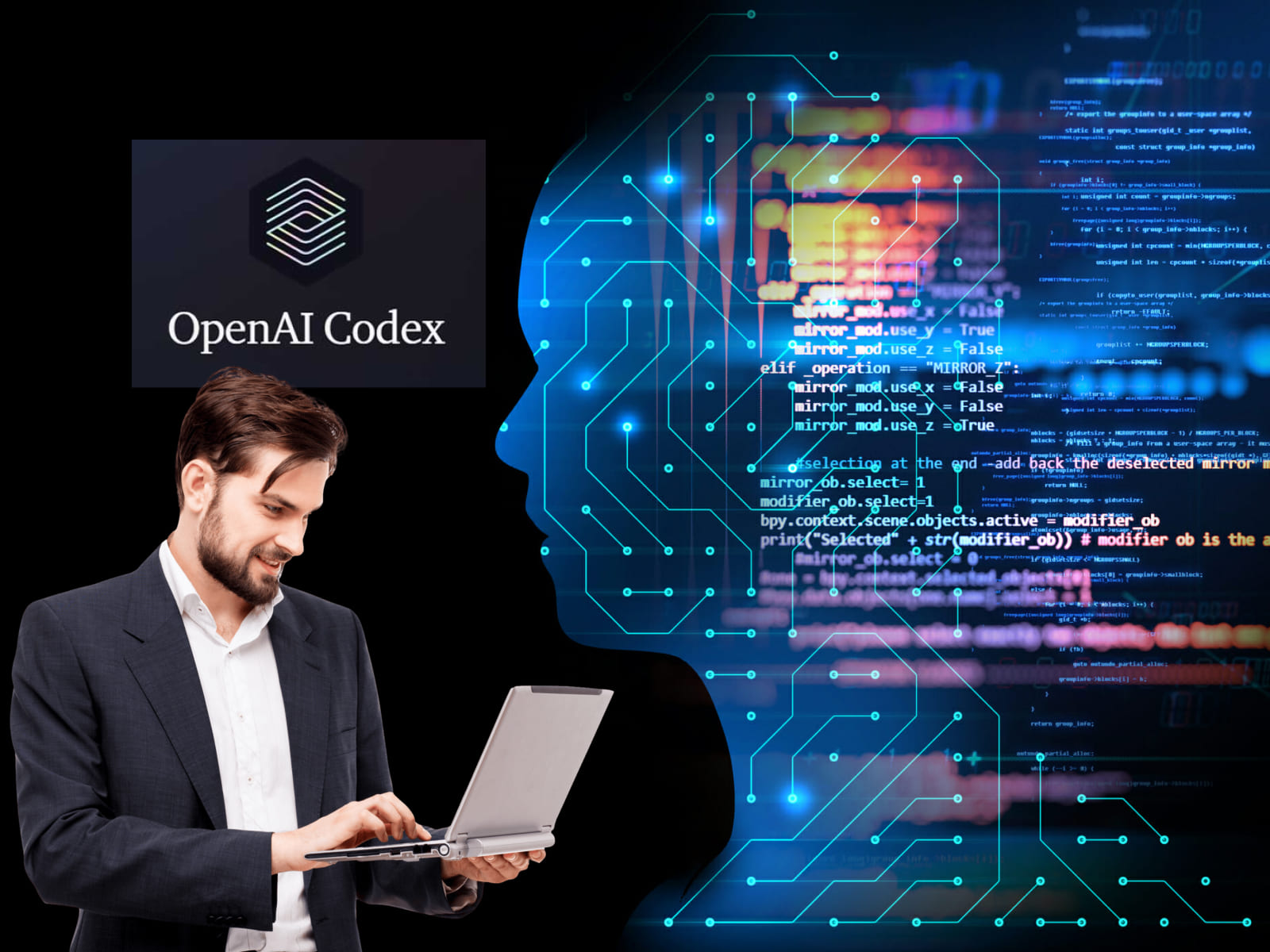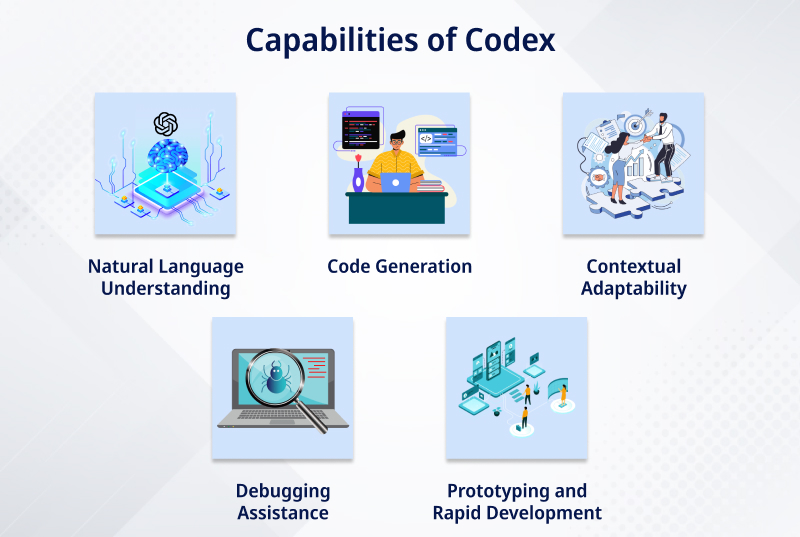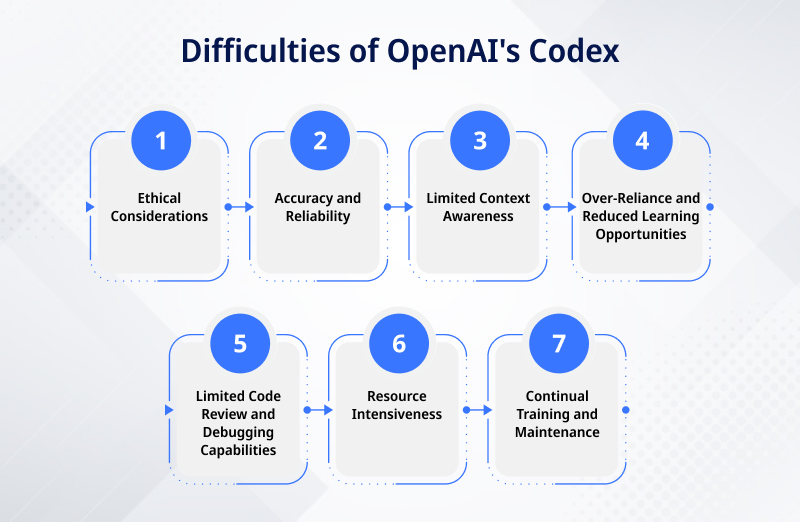Traditional programming can be time-consuming and error-prone, often demanding extensive lines of code to achieve desired outcomes. But what if programming becomes as intuitive as a conversation?
What if an AI-powered tool could seamlessly understand your instructions and effortlessly generate precise, contextually appropriate code?
Enter OpenAI’s Codex – a groundbreaking advancement in AI-powered programming.
In this blog post, we’ll explore how OpenAI’s Codex is reshaping the coding landscape, providing developers with a powerful ally in crafting software solutions.
Table of Contents
Understanding OpenAI’s Codex
OpenAI’s Codex Artificial Intelligence model, based on the GPT-3.5 architecture, represents a significant leap in AI-driven programming. Trained on a diverse dataset encompassing multiple programming languages, libraries, and frameworks, Codex excels in natural language comprehension and produces precise, contextually relevant code.
Its adaptability across numerous programming languages makes Codex invaluable for developers across different domains and experience levels. A key advantage is its proficiency in understanding complex instructions and generating code. From web development to data analysis and machine learning, Codex is adept in various programming paradigms.
Moreover, Codex maintains coherence and relevance in lengthy dialogues, ensuring its contextual understanding remains intact throughout exchanges. This feature proves highly beneficial for developers tackling intricate or multifaceted code tasks.
Unleash the Full Potential of Codex for Your Projects! Connect with us and explore its Remarkable Capabilities Today.
Capabilities of Codex
OpenAI’s Codex has remarkable capabilities, making it a powerful tool for developers across various domains. Here, we delve into three key aspects that define its expertise:
Natural Language Understanding
Codex is praised for its aptitude for interpreting natural language. It was trained on a big dataset of various libraries, frameworks, and programming languages.
- Coden can understand complicated programming-related human language inquiries.
- Codex excels at understanding and interpreting the subtleties of the given text, whether it is a request for a particular function, an explanation of a programming concept, or a comprehensive method.
As a result, the efficiency and productivity of the development process are considerably increased because developers can communicate their thoughts and requirements naturally and intuitively.
Code Generation
The capacity of Codex to produce extremely accurate and contextually suitable code is one of its most outstanding features.
- Codex can smoothly convert commands given in natural language into usable code fragments thanks to its in-depth understanding of programming languages.
- Codex can take on difficult coding tasks, giving it a flexible tool for various development projects.
- Codex can quickly produce code that fits the situation, whether for machine learning, data analysis, or web development.
Codex is an invaluable tool for developers looking for precise and effective programming solutions because of its robust code-generation capabilities.
Contextual Adaptability
The adaptability of Codex is demonstrated by its capacity to adapt to various programming environments.
- It can easily switch between different frameworks and programming languages, ensuring that it continues to be an important tool for developers of all levels and specialties.
- With its contextual adaptability, Codex may be used for various tasks, from front-end web development to back-end system architecture.
Codex’s ability to comprehend and generate code in the proper context makes it a priceless tool for developers wishing to improve their coding skills and optimize their workflow.
Debugging Assistance
Codex is more than simply a code generator; it may be a beneficial debugging tool.
- It can assist in locating and addressing frequent mistakes or defects in the code while offering ideas for potential remedies.
- Codex can provide insights and suggestions that speed up the debugging process, even though it may not completely replace an experienced developer’s experience.
This feature is beneficial for identifying syntax issues, logical inconsistencies, and other typical programming faults, ultimately resulting in more robust and dependable code.
Prototyping and Rapid Development
Codex is a crucial tool for prototype and quick development since it can produce precise and contextually appropriate code.
- It expedites the early phases of a project by enabling developers to transfer their concepts into working code swiftly.
- When building an MVP or a proof of concept, the features of Codex can shorten the development cycle and enable agile and iterative software development approaches.
The prototyping efficiency and speed can be a huge benefit, allowing developers to test and iterate on ideas more quickly. This makes it the perfect partner for initiatives that call for quick invention and adaptation.
Also Read: Continual Learning: How Software Can Evolve Post-Deployment with AI?
Challenges and Limitations of OpenAI’s Codex
Despite being a big step forward for AI-powered programming, OpenAI’s Codex has challenges and limitations. Let’s look at some of the important factors that users and developers should be aware of:
Ethical Considerations: There are significant ethical questions raised by incorporating Codex into the development process.
- When using Codex for jobs involving sensitive or proprietary code, privacy issues could come up.
- Due to its training data, openAI’s codex in artificial intelligence model may unintentionally display biases.
To protect their intellectual property, businesses should create strict data handling procedures and developers should use caution when disclosing sensitive information.
Users must take precautions to maintain fairness and inclusion in their applications and be aware of any potential bias in code suggestions.
Accuracy and Reliability: While Codex is excellent at producing code, it is not faultless.
- Erroneous or illogical output may result from ambiguous or poorly designed queries.
- Codex has excellent contextual comprehension but sometimes misinterprets the user’s purpose and suggests inappropriate codes.
It’s crucial for developers to give Codex clear instructions and to examine the generated code thoroughly. Developers should carefully check the Codex-generated code, especially those working on important or high-stakes projects.
Limited Context Awareness: Codex may struggle to maintain long-term context, which could affect how well it performs on difficult or lengthy projects.
- Developers should understand this restriction and design their interactions with Codex accordingly.
- Additional human engagement and monitoring may be required when a thorough understanding of the project’s history and context is essential.
Over-Reliance and Reduced Learning Opportunities: Despite being a valuable tool, Codex runs the risk of becoming overused.
- Developers’ independence in writing code could suffer if they rely too heavily on Codex for code generation.
- This might make it more difficult for them to solve problems and have a deeper understanding of programming ideas.
To continue polishing their programming skills, developers must balance utilizing Codex’s features and actively participating in the learning process.
Resource Intensiveness: Codex’s resource requirements can challenge some developers.
- Effective use of it requires a lot of computational power, which is a barrier for people who don’t have easy access to high-performance gear.
- Additionally, Codex requires an internet connection, which may not always be possible or readily available in some settings.
Developers working in resource-constrained environments or on projects with strict budget limits may find this resource-intensiveness a limiting factor.
Continual Training and Maintenance: The performance of Codex is highly dependent on its training data and the changing environment of programming languages and frameworks.
- Codex may need ongoing training and upgrades to stay current when new languages are developed and existing ones change.
- Users may need to adjust to new versions and interfaces due to OpenAI’s continuing development and improvement.
Developers and organizations may find it difficult to keep up with these improvements since they must remain informed and may need to adapt their workflow and procedures to take advantage of Codex’s developing capabilities.
Future Prospects of AI-Powered Programming
As AI-powered programming develops, promising future developments will alter how developers communicate and work completely. These are the next two major future developments:
Integration with Development Environments
The software development landscape will shift dramatically by incorporating AI models like Codex with popular programming platforms. With this development, developers might easily integrate AI-assisted coding skills into the platforms and tools they already work with daily.
Visual Studio Code, PyCharm, or Atom are examples of prominent incorporated Development Environments (IDEs) into which Codex might be incorporated.
With the help of this connection, developers would have access to contextually relevant real-time suggestions and code completions that were also customized to fit their particular coding style. It greatly increases productivity, eases developers’ cognitive burdens, and is a valuable tool for writing high-caliber code.
Collaborative Coding
The way teams cooperate on coding projects has the potential to change because of AI-powered programming models like Codex. Codex can help in the collaborative coding process by acting as a virtual team member, bridging knowledge gaps, and accelerating development cycles.
Consider a situation where a project is being worked on by several developers with various backgrounds and levels of expertise. Codex can provide tips for code optimization, help maintain uniformity in coding standards, and even make it easier to incorporate team member contributions.
This cooperative dynamic can increase development teams’ productivity while fostering a more welcoming and inclusive coding environment where programmers may share knowledge and work together to solve difficult problems.
Discover how AI integration and collaborative coding are reshaping software development. Elevate your coding and team productivity with Codex-powered AI programming.
How can PixelCrayons Help in AI-Powered Programming?
PixelCrayons plays a pivotal role in advancing AI-powered programming by leveraging cutting-edge technologies and expertise in software development. We provide specialized solutions that tap into the potential of AI models like OpenAI’s Codex with our committed team of talented developers and thorough grasp of AI.
By harnessing the capabilities of AI, we empower businesses to create more intelligent and efficient software solutions. Whether automating routine coding tasks or implementing sophisticated AI algorithms, we stand at the forefront of helping businesses leverage AI-powered programming for enhanced productivity and innovation.
Final Words
OpenAI’s Codex marks a significant leap forward in AI-powered programming. Its exceptional natural language understanding and code generation capabilities open up new horizons for developers, promising to streamline workflows and bolster creativity.
While it’s not a replacement for human programmers, Codex is a powerful ally, enhancing productivity and enabling more efficient code creation. Integrating Codex into our toolkit holds immense potential to revolutionize how we write, debug, and collaborate on code as we navigate the future of software development.
You can also hire AI developers to embrace this cutting-edge technology is a stride towards a more efficient, innovative, and exciting era in programming.






